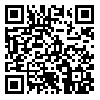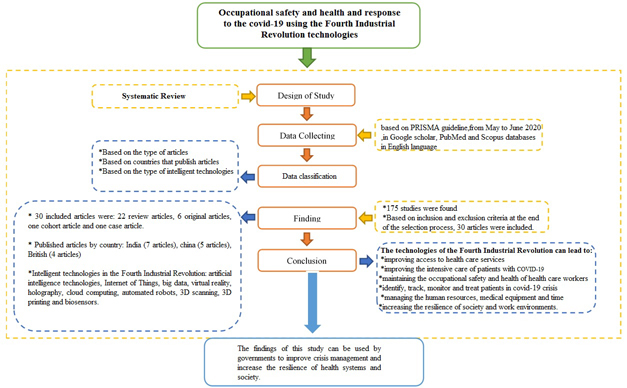Volume 10, Issue 4 (11-2020)
J Health Saf Work 2020, 10(4): 329-348 |
Back to browse issues page
Download citation:
BibTeX | RIS | EndNote | Medlars | ProCite | Reference Manager | RefWorks
Send citation to:



BibTeX | RIS | EndNote | Medlars | ProCite | Reference Manager | RefWorks
Send citation to:
Zaroushani V. Occupational Safety and Health and Response to COVID-19 using the Fourth Industrial Revolution Technologies. J Health Saf Work 2020; 10 (4) :329-348
URL: http://jhsw.tums.ac.ir/article-1-6411-en.html
URL: http://jhsw.tums.ac.ir/article-1-6411-en.html
1 PhD. Department of Occupational Health Engineering, Faculty of Health, Qazvin University of Medical Sciences, Qazvin, Iran. 2 Social Determinants of Health Research Center, Qazvin University of Medical Sciences, Qazvin, Iran. , .zaroushani@qums.ac.ir
Abstract: (12066 Views)
Introduction: The world is currently facing an all-out crisis over the coronavirus disease 2019 (COVID-19). This review study aimed to determine the applications of the assistive intelligent technologies of the Fourth Industrial Revolution (Industry 4.0) in occupational safety and health (OSH) and response to COVID-19.
Material and Methods: The given review was carried out from May to June 2020 and the search strategy was fulfilled in the databases of Google Scholar, PubMed, and Scopus. The keywords were collected from the Medical Subject Headings (MeSH) database and searched individually or in combination. Accordingly, the articles with the term “COVID-19” in their titles or abstracts and some other keywords such as “smart hospital, Industry 4.0, or intelligent technology” were selected and reviewed. Next, the titles, abstracts, and keywords of these studies were examined. To augment the sensitivity of the search, the keywords and the references of the selected articles were also surveyed. Then, the related studies were separated from the irrelevant ones and the duplicates were removed. Finally, the full texts of the selected articles were reviewed.
Results: In this resepct, a total number of 175 studies, published in the databases of Google Scholar, PubMed, and Scopus in 2020 were retrieved. According to the inclusion and exclusion criteria and qualitative screening, 30 articles were included in this review. The assistive intelligent technologies such as artificial intelligence (AI), the internet of things (IoT), big data, virtual reality (VR), holography, cloud computing, autonomous robots (autorobots), three-dimensional (3D) scanning, 3D printing, and biosensors were established as useful ones to respond to COVID-19. In addition, AI and autorobots could be the most significant technologies of Industry 4.0 in the incoming articles.
Conclusion: These technologies can thus help governments to identify, track, monitor, and treat patients and increase resilience in society and workplace environments during the COVID-19 pandemic.
Material and Methods: The given review was carried out from May to June 2020 and the search strategy was fulfilled in the databases of Google Scholar, PubMed, and Scopus. The keywords were collected from the Medical Subject Headings (MeSH) database and searched individually or in combination. Accordingly, the articles with the term “COVID-19” in their titles or abstracts and some other keywords such as “smart hospital, Industry 4.0, or intelligent technology” were selected and reviewed. Next, the titles, abstracts, and keywords of these studies were examined. To augment the sensitivity of the search, the keywords and the references of the selected articles were also surveyed. Then, the related studies were separated from the irrelevant ones and the duplicates were removed. Finally, the full texts of the selected articles were reviewed.
Results: In this resepct, a total number of 175 studies, published in the databases of Google Scholar, PubMed, and Scopus in 2020 were retrieved. According to the inclusion and exclusion criteria and qualitative screening, 30 articles were included in this review. The assistive intelligent technologies such as artificial intelligence (AI), the internet of things (IoT), big data, virtual reality (VR), holography, cloud computing, autonomous robots (autorobots), three-dimensional (3D) scanning, 3D printing, and biosensors were established as useful ones to respond to COVID-19. In addition, AI and autorobots could be the most significant technologies of Industry 4.0 in the incoming articles.
Conclusion: These technologies can thus help governments to identify, track, monitor, and treat patients and increase resilience in society and workplace environments during the COVID-19 pandemic.
Keywords: Fourth Industrial Revolution, Covid-19, Epidemics, Assistive Technologies, Occupational Safety and Health, Intelligent Technologies
Type of Study: Research |
Received: 2020/12/2 | Accepted: 2020/11/30 | Published: 2020/11/30
Received: 2020/12/2 | Accepted: 2020/11/30 | Published: 2020/11/30
Send email to the article author
| Rights and permissions | |
 |
This work is licensed under a Creative Commons Attribution-NonCommercial 4.0 International License. |






